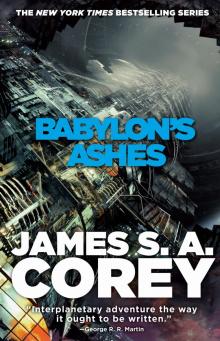- Home
- James S. A. Corey
The Churn Page 2
The Churn Read online
Page 2
“No fever,” she said.
“Probably nothing,” he said, pulling his shirt up over his head. “I got the shakes a little, and I got dizzy a couple times on the way back. It ain’t serious.”
“What happened to the man Burton sent you to?”
“I shot him.”
“Did you kill him?” Lydia asked as she walked back to her bedroom. The ruddy light of sunset filtered through yellow silk. An old armoire stood against one wall, its silver finish stained and corroded by years. The bed was the same cheap foam queen-sized she’d had when she was working, the sheets old and thin, softer than skin with wear.
“Used a shotgun about a meter from his chest,” Timmy said, following her. “Could have stuck your fist through the hole. So, yeah, pretty much.”
“Have you ever killed a man before?” she asked, lifting her dress up over her thighs, her hips, her head.
Timmy undid his belt, frowning. “Don’t know. Beat some guys pretty bad. Maybe some of ’em didn’t get back up, but no one I know about. You know, not for sure.”
Lydia unhooked her bra, letting it slide to the cheap carpet. Timmy took his pants down, kicking them off with his shoes. He didn’t wear underwear, and his erect penis bobbed in the air like it belonged to someone else. There was no desire in his expression, and only a mild distress.
“Timmy,” she said, lying back on the bed and lifting her hips. “You aren’t getting ill. You’re traumatized.”
“Y’think?” He seemed genuinely surprised by the thought. And then amused by it. “Yeah, maybe. Huh.”
He pulled her underwear down to her knees, her ankles. “My poor Timmy,” she murmured.
“Ah shit,” he said, lowering his body onto hers. “I’m all right. At least I’m not getting sick.”
Sex held few mysteries for Lydia. She had fucked and been fucked by more men than she could count, and she’d learned things from each of them. Ugly things sometimes. Sometimes beautiful. She understood on a deep, animal level that sex was like music or language. It could express anything. Love, yes. Or anger, or bitterness, or despair. It could be a way to grieve or a way to take revenge. It could be a weapon or a nightmare or a solace. Sex was meaningless, and so it could mean anything.
What she and Timmy did to and for and with each other’s bodies wasn’t a thing they discussed. She felt no shame about it. That other people would see only the perversion of a woman and the boy she’d helped raise pleasuring one another meant that other people would never understand what it mean to be them, to survive the world they survived. They were not lovers, and never would be. They were not surrogate mother and incestuous son. She was Lydia, and he was Timmy. In the bent and broken world, what they did fit. It was more than most people had.
After, Timmy lay beside her, his breath still coming in small, reflexive gulps. Her body felt pleasantly tender and bruised. The yellow over the window was fading into twilight, and the rumble of air traffic was like constant thunder in the distance, or a city being shelled two valleys over. A transport ship for one of the orbital stations, maybe. Or a wing of atmospheric fighter planes on exercises. So long as she didn’t look, she could pretend it was anything. Her mind wandered, delivering up what had been nagging at her since Timmy had told her all that had happened.
Burton had sent Timmy to collect a debt, Timmy had killed the man instead, and Burton hadn’t cut him loose. Two points defined a line, but three defined the playing field. Burton didn’t always have need of boys like Timmy, but sometimes he did. Right now, he did.
Lydia sighed.
The churn was coming. It was the name Liev had given it, back before. All of nature had its rhythms, its booms and busts. She and Timmy and Liev and Burton were mammals, they were part of nature, and subject to its rules and whims. She had lived through perhaps three, perhaps four such catastrophes before. Enough that she knew the signs. Like a squirrel gathering food before a hard winter, Burton collected violent men before the churn. When it came, there would be blood and death and prison sentences and maybe even a curfew for a time. Men like Timmy would die by the dozen, sacrificed for things they didn’t know or understand. Maybe even some of Burton’s lieutenants would fall the way Tanner Ford had back when she’d been Liev’s lover. Or Stacey Li before him. Or Cutbreath. The history of her corrupted world echoed with the names of the dead; the expendable and the expended. If Burton had kept Timmy on, it was because he thought it was coming. And if Burton thought it was coming, it probably was.
Timmy’s breath was low and deep and regular. He sounded like a man asleep, except his eyes were open and fixed on the ceiling. Her own skin was cool now, the sweat dried or nearly so. A fly swooped through the air above them, a gray dot tracing a jagged path, turning and dodging to avoid dangers that weren’t there. She lifted her first two fingers, cocked back her thumb, and made a thin cartoon shooting sound with her teeth and tongue. The insect flew on, undisturbed by her small and violent fantasy. She turned her head to look at Timmy. His expression was blank and empty. He was still, and even in the warmth that followed orgasm, there was a tension in his body. He wasn’t a beautiful boy. He’d never be a beautiful man.
Someday, she thought, I will lose him. He will go off on some errand and he will never come back. I won’t even know what happened to him. She probed at the thought like a tongue-tip against the sore gum where a tooth has been knocked out. It hurt and hurt badly, but it hadn’t happened yet, and so she could bear it. Best to prepare herself now. Meditate upon the coming loss so that when it came, she was ready.
Timmy’s eyes clicked over toward her without his head shifting at all, without any expression coming to his face. Lydia smiled a slow, languorous smile.
“What are you thinking?” she asked.
He didn’t answer.
The catastrophe began four days later. Quietly, and with near-military precision, the city opened a contract with Star Helix security. Soldiers from across the globe arrived in small groups and sat through debriefings. The plan to end the criminal networks operating in Baltimore would be announced after the fact, or at least after the first wave. The thought, widely lauded by the self-congratulatory minds in administration, was to take the criminal element by surprise. In catching them flat-footed, the security teams could cripple their networks, break their power, and restore peace and the rule of law. The several unexamined assumptions in the argument remained unexamined, and the body armor and riot control weapons were distributed in perfect confidence that the enforcers would arrive unanticipated.
In fact, what Burton and Lydia knew from experience, many, many others felt by instinct. There was a discomfort in the streets and alleys, on the rooftops, and behind the locked doors. The city knew that something was near. The only surprise would be in the details.
Erich felt it like an itch he couldn’t scratch. He sat on the rotting concrete curb, drumming the fingers of his good hand against his kneecap. The street around him was the usual mix of foot traffic, bicycles, and wide blue buses. The air stank. The sewage lines this near the water were prone to failures. A few doors to the east, a group of children were playing some kind of complex game with linked headsets, their arms and legs falling into and out of phase with each other. Timmy stood on the sidewalk, squinting up into the sky. Behind them was a squatter’s camp in an old ferrocrete apartment block. In a locked room at its center, Erich’s custom deck was set up and primed, connected to the network and prepared to create a new identity from birth records to DNA matching to backdated newsfeed activity for the client, as soon as she arrived. Assuming she arrived. She was fifteen minutes late and, though they had no way to to know it, already in custody.
Timmy grunted and pointed up. Erich followed the gesture. Far above, a star burned in the vast oceanic blue, a plume of fire pushing a ship out of the atmosphere. Near the horizon, the half moon glowed pale, a network of city lights crossing the shadowy meridian.
“Transport,” Erich said. “They use mass drivers for the stuff
that can take the gees.”
“I know,” Timmy said.
“Ever want to go up there?”
“What for?”
“I don’t know,” Erich said, staring down the street for the client. He’d seen her picture: a tall Korean woman with blue hair. He didn’t know who she’d been before, and he didn’t much care. Burton wanted her made into someone new. “Piss out the window and make everyone down here think it was raining, maybe.”
Timmy’s chuckle sounded polite.
“It’s what I’d do, if I could,” Erich said, making a swooping gesture with his good hand. Zoom. “Get up the well and out of here. Go where no one cares about who you are so long as you’re good at what you do. Seriously, it’s the wild fucking west up there. You want nineteenth-century Tombstone, Arizona, it’s alive and well on Ceres Station. From what I heard, anyway.”
“Why don’t you go, then?” Timmy said. With a different intonation, it could have been dismissive. Instead it was only a mild kind of curiosity. It was part of what Erich liked about Timmy. There was almost nothing he seemed to feel deeply.
“Starting from here? I’d never make it. I’m not even a registered birth.”
“You could tell them,” Timmy said. “People get registered all the time.”
“And then they get tracked and monitored and wind up dying on basic,” Erich said. “Anyway, no one’s taking me for a vocational. Waiting lists for that are eight, ten years long. By the time I came up, I’d have aged out.”
“Could build one, couldn’t you?” Timmy asked. “Make a new identity and put it at the front of the list?”
“Maybe,” Erich said. “If you gave me a couple years to layer it all in like I did for Burton. He can go anywhere with docs I built for him.”
“So why don’t you go, then?” Timmy asked again, his inflection as much an echo as his words.
“Guess I don’t want it bad enough. Anyway, I’ve got real stuff to do, don’t I? I wish she’d fucking get here, right?” Erich said, unaware that he made everything a question when he wanted to change the subject. Unconsciously, he made a fist with the hand of his bad arm. Timmy nodded, squinting down the street for the client that wasn’t coming.
Most of their lives had been spent on streets like this. The trade that exploited prostitutes and their illegal children was the second largest source of unregistered births in the city. Only religious radicals accounted for more. It was impossible to know how many unregistered men and women were eking out lives on the margin of society in Baltimore or how many had lived and died unknown to the vast UN databases. Erich knew of perhaps a hundred scattered among the legitimate citizens like members of a secret society. They congregated in condemned buildings and squats, traded in the gray-market economy of unlicensed services, and used their peculiar anonymity where it was most helpful. Looking down the pocked asphalt street, Erich could count three or four people that he personally knew were ghosts in the great world machine. Counting him and Timmy, that was half a dozen all breathing the same air while the plume of the orbital transport marked the sky gold and black above them. There was old water in the gutters, black circles of gum and tar on the sidewalk, the combined smell of urine and decay, and ocean all around them. Erich looked up at the sky with a longing he resented.
He knew himself well enough to recognize that he was a man of desires and grudges, so well in fact that he’d come to peace with it. The blackness of space where merit counted more than the placement on a bureaucrat’s list, where the brothels were licensed and the prostitutes had a union, where freedom was a ship and a crew and enough work to pay for food and air. It called to him with a romance that made his heart ache. On Ceres or Tycho or Mars, the medical technology was available to regrow his crippled arm, to remake his shortened leg. The same technology could be found fewer than eight miles from the filthy curb where he sat, but with the triple barriers of being unregistered, basic medical care waiting lists, and his own ability to function despite his disabilities, space was closer. Out there, he could be the man he should have been. The thought was like the promise of sex to a teenager, rich and powerful and frightening. Erich had resolved a thousand times to make the effort, to build himself an escape identity and shrug off the chains of Earth, of Baltimore, of the life he’d lived. And a thousand and one times, he had postponed it.
“Get up,” Timmy said.
“You see her?” Erich said.
“Nope. Get up.”
Erich shifted, frowning. Timmy was looking east with an expression of mild curiosity, a casual witness at someone else’s wreck. Erich stood. At the intersection a block down, two armored vans had pulled to a stop. The logo on their sides was a four-pointed star. Erich couldn’t tell if the people getting out were men or women, only that they were wearing riot gear. Metallic fear flooded his mouth. Timmy put a strong hand on his shoulder and pushed him gently but implacably across the street. Two more vans came to a halt at the intersection to the north.
“What the fuck?” Erich said, his voice distant and shrill in his own ears.
Timmy got him across the street and almost up to the doors of a five-story squat before Erich pulled back. “My deck. My setup. We’ve got to go back for it.”
A deep, inhuman voice broke the air, the syllables designed in a sound lab to be sharp, clear, and intimidating. This is a security alert. Remain where you are with your hands visible until security personnel clear you to leave. This is a security alert. At the intersection, teams of armored figures were already questioning three men. One of the civilians—a thin, angry man with close-cropped black hair and dark olive skin—shouted something, and the security team pushed him to his knees. The biometric scan—fingerprints, retina scan, fast-match DNA—took seconds while the man’s arms were held out at his sides, his elbows bent back in restraint holds.
“I think maybe you used to have a deck,” Timmy said. “I don’t think you got one right now.”
Erich stood unmoving, caught between the animal urge to flee and to protect himself by hiding the evidence. Timmy’s thick fingers closed around his good shoulder. The big kid’s expression was mildly concerned. “We don’t go right now, they’re gonna have you and it both. I sorta screwed up the last thing Burton told me to do. Let’s not burn my second chance getting you caught.”
This is a security alert. Remain where you are with your hands visible until security personnel clear you to leave.
Erich swallowed and nodded. It was the nearest he could come to speech. Timmy turned him toward the squat and pushed him forward.
In the streets, the security teams converged slowly, moving from person to person, door to door, floor to floor. Before the operation was through, they would identify three hundred forty-three people and detain four who appeared in the operational database as persons of interest. Three unregistered individuals would be identified, entered into the system, and held pending investigation. The two of the unregistered who refused to provide a name would have names assigned to them. The operation, covering three city blocks, would locate an unlicensed medical clinic, three children in distressed circumstances, seven pounds of S-class psychoactives, eighty-two instances of illegal occupation, and the network interface deck and data collection setup offered up by a blue-haired detainee in exchange for a reduced penalty. The process would take ten hours, and so it was still hardly under way when Timmy and Erich emerged from the undocumented access tunnel that connected the squat with an abandoned seawater pumping station. They walked together, Erich with his good hand stuffed deep in his pocket, Timmy with the same amiable air that was his default. Erich was weeping silently. Above them, the transport ship was gone, the golden exhaust plume now only a streak of smoke against the sky.
“I’m dead,” Erich said. “Burton’s going to fucking kill me. They got my deck. They got everything.”
“Wait a minute,” Timmy said. “Everything everything? Burton’s stuff was on the—”
“No. I’m not stupid. I don’t store re
cords of how I keep Burton clean. But I didn’t wash it down after the setup. I was going to do it after we were done. It’s going to have DNA on it. Shit, it may even have fingerprints. I don’t know.”
“So what if it does?” Timmy asked with a shrug. “You’re not in the system.”
“Not now,” Erich said. “But if they pick me up ever, for anything, it’s going to be with a little highlight alert linking back to that fucking deck. They’ll know what I do. And then they’ll know to ask.”
“You don’t gotta say anything,” Timmy said, his tone almost apologetic.
“I won’t get a chance. Burton finds out they’ve got my DNA, all he’s gonna see is a path back to him. I’m a loose end, man. I’m dead.”
All around the city, traps shut.
In the north, five dozen armored security personnel blocked intersections and shut down metro stations. The door-to-door search and control operation converged on a seven-story office building controlled by the Loca Griega. The local men and women took shelter where they could, hiding in bathtubs and basements and soot-caked hard-brick fireplaces. Things dense enough to hopefully block the infrared and backscatter and heartbeat sensors Star Helix carried. Network signals went dark. The Star Helix employees moved forward in tight formation, forced to use their eyes instead of their tech, the plates of armor on their chests and backs and bellies making them seem like vast beetles in the autumn sunlight. When the perimeter around the building was established, monitoring stations were constructed, watching the windows for the vibrations made by voices. A wave of dragonfly-small surveillance drones swept in, and for a moment it seemed like perhaps the violence wouldn’t come. And then, as one, the hundreds of small, cheap Star Helix robots fell to the ground, victims of Loca Griega countermeasures, and the building bloomed with gunfire. Seventeen Loca Griega died before the sun went down, including Eduard Hopkins and Jehona Dzurban, reputed to be the Earth-surface coordinators of the Belt-based syndicate. The plume of smoke that rose from the building darkened the air for hours and left the city air gray and hazy the next morning.

 Leviathan Wakes
Leviathan Wakes Gods of Risk
Gods of Risk Babylon's Ashes
Babylon's Ashes Expanse 03 - Abaddon’s Gate
Expanse 03 - Abaddon’s Gate Tiamat's Wrath
Tiamat's Wrath Persepolis Rising
Persepolis Rising The Butcher of Anderson Station
The Butcher of Anderson Station The Churn
The Churn Expanse 05 - Nemesis Games
Expanse 05 - Nemesis Games Strange Dogs
Strange Dogs Honor Among Thieves: Star Wars
Honor Among Thieves: Star Wars Cibola Burn
Cibola Burn Caliban's War
Caliban's War The Vital Abyss
The Vital Abyss Auberon
Auberon Persepolis Rising (The Expanse)
Persepolis Rising (The Expanse) Caliban's War: Book Two of the Expanse series
Caliban's War: Book Two of the Expanse series Leviathan Wakes: Book One of The Expanse
Leviathan Wakes: Book One of The Expanse Cibola Burn (Expanse)
Cibola Burn (Expanse) Strange Dogs (Expanse)
Strange Dogs (Expanse) The Vital Abyss: An Expanse Novella (The Expanse)
The Vital Abyss: An Expanse Novella (The Expanse) Leviathan Wakes e-1
Leviathan Wakes e-1 Abaddon's Gate e-3
Abaddon's Gate e-3 Caliban;s war e-2
Caliban;s war e-2 Gods of Risk: An Expanse Novella
Gods of Risk: An Expanse Novella Honor Among Thieves: Star Wars (Empire and Rebellion)
Honor Among Thieves: Star Wars (Empire and Rebellion)